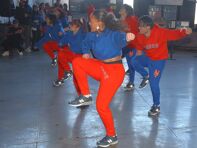When you visit the Twitter page of Texas Rangers beat writer Alex Plinck, the first thing you see has nothing to do with Joey Gallo, Elvis Andrus, a new ballpark that looks like it stores the Ark of the Covenant, or anything directly related to baseball at all.
Instead, Plinck’s pinned tweet is his public announcement from Pride Month coming out to his followers as gay. It’s accompanied by a photo of Plinck showing the rainbow Pride bracelet that he wears on the job every day.
Even though most of Plinck’s other tweets are understandably devoted to the happenings with the Rangers, there’s no mistaking who he is as a proud gay man.
As the calendar moves through June and #PrideMonth , I feel it's this is the right time to come out as a gay man. To anyone who helped me, listened, and accepted, I can't thank you enough. Honestly, you saved my life.
— Alex Plinck (@aplinckTX) June 14, 2020
Now lets get some freaking baseball started and "Play Ball!" pic.twitter.com/Kg4iI8AJmt
Last week on The 3 Strikes, You’re Out podcast, Plinck spoke to me about his experience covering the team since coming out. Happily, this is a Texas baseball story that ends well:
“To me, it’s a weight lifted off — a lot of great support. It’s either positive feedback or people just don’t care and quite frankly, I’ll take the ‘people don’t care…’
“You always have that little fear and then ultimately, you just say, ‘You know what? This is me. Deal with it.’ People kinda give me crap for it but they liked [my work] before! I’d be like, ‘Well… you know… I was gay when I wrote this!’”
As I told Alex on the podcast, he just came up with the perfect title for his autobiography.
His story also illustrates that baseball culture has made some significant strides in terms of acceptance and inclusion in the past few years. It wasn’t that long ago that an MLB clubhouse was a haven for toxic masculinity and players would lash out in disturbing ways against anyone who tried to enter a space that they felt was the sole domain of straight men.
For example, there are untold horror stories about abusive ballplayer responses from the days when women reporters were first allowed in the locker room in the 1970s, 80s and even the 90s. Future Hall of Famer Jack Morris once responded to an interview request from the late reporter Jennifer Frey by declaring, “I don’t talk to women when I’m naked unless they’re on top of me or I’m on top of them.”
Charming. Morris, for his part, has since realized this isn’t the kind of thing one human being should ever say to another.
Then there was the time Dave Kingman infamously sent a live rat to sportswriter Susan Fornoff in the press box with a note reading “My name is Sue.” He later told the press, “This is a man’s clubhouse. If someone can’t take a simple joke, they shouldn’t be in the game.”

And if these were the reactions to cisgender women, you can only imagine how ballplayers of this era would’ve felt about a gay sportswriter attempting to do his job in the clubhouse.
Contrast that with what Plinck told me about his experiences with the current Rangers team and it’s almost enough to give you a bit of hope:
“It’s about the relationship you build. So I think what’s good is that for me, last year, [I was] able to get used to everybody around… [they’d] get to know me, get to know my personality. I think that’s why this year the reaction from Rangers personnel [and] from other writers has been so plus. Because they’ve gotten to know the individual. And it’s just like, ‘OK, now you just know something else about me…’
“You build that rapport with certain players and the manager. That’s why I think the players nowadays, they’re so much more receptive. Because they’re around it a little more.”
Imagine: today’s players are taking the time to get to get to know writers who are different from them and accept them for who they are. Instead of… you know… sending them vermin. It’s like, all of a sudden, MLB teams decided to sign players based on the market inefficiency of human decency.
Thanks to his job, Alex Plinck has been one of the lucky few to see a baseball game in person this year. It also sounds like he’s had the good fortune to find out firsthand about one quality where baseball players have definitely changed for the better.
Click here to listen to Alex Plinck on The 3 Strikes, You’re Out podcast.







































